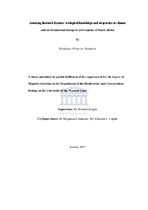| dc.description.abstract | Challenges that come with micro-level climate change projections have resulted in
the inadequacy of our understanding of local climatic changes and the appropriate
adaptation strategies. This has resulted in indigenous communities relying on their
local knowledge for local scale climatic changes and suitable adaptation practices.
Coping and adapting to climate and its impacts has been occurring since human
existence, however, humans are still vulnerable due to the rapid rate that the
climate is changing. Adaptation is vital for all global people, especially living in
semi-arid or arid regions, as it provides a solution for food shortages and
livelihoods. Global livestock farmers have, over many years, accumulated local
ecological knowledge; and it is from this knowledge that decisions are made.
Local knowledge related to adaptation to climate change and variability has
largely not been recognized or documented and it is only lately that it is deemed
to be critical in formulating policies to mitigate the harsh effects of the rapidly
changing climate. This study was focused on the local knowledge and
understanding of climate change and variability (and associated environmental
change) with its impacts and adaptation of communal livestock farmers in the
semi-arid regions of the Northern Cape Province in South Africa. Two communal
areas namely, Leliefontein and Steinkopf in Northern Cape served as study sites.
A case study approach, with triangulation of focus group discussions and semistructured
interviews, was used. The focus group discussions were aimed at
drawing up a seasonal calendar, where 10 livestock farmers from Leliefontein and
14 from Steinkopf participated. The focus group discussions were followed by indepth
semi-structured interviews, where a total of 20 livestock farmers from each
study site were interviewed. While various other studies highlight the lack of
awareness and understanding of climate change among livestock communal
farmers, this study found that 90 % and 55 % of the interviewed Steinkopf and
Leliefontein livestock farmers had an understanding of the phenomenon. The
interviewed farmers referred to the phenomenon of climate change as "seasonal
shifts" that they have been experiencing. Findings of the study indicated that
intergeneration knowledge transfer and media sources contributed as sources of
climate and farming management information. The basic, but wealthy knowledge of farmers informs them of potential climate change impacts and possible
adaptation strategies. The study also revealed that even though adaptation
measures are being carried out by livestock farmers I n the two study sites, that
there are general barriers which include financial, biophysical environment, social
and institutional barriers that inhibit effective adaptation. Recommendations from
this study were that policies should consider and protect local knowledge; and that
the factors that affect successful adaptation strategies of communal livestock
farmers should be considered when adaptation programmes are planned. | |

